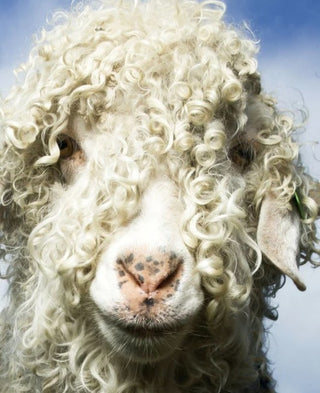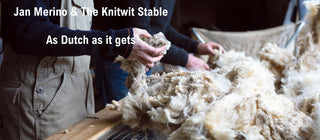Every year about 1.2 million kilos of Dutch wool is lost because sheep farmers cannot get a decent price for it. At the same time, we buy mountains of plastic clothing, which are made in Asia under appalling conditions and wear out quickly. While a wool sweater can last up to 75 years... With The Knitwit Stable, Reina Ovinge wants to make consumption less the norm and show that – if you do it right – wool is a lot less damaging to the Earth than is often thought.
We have to make a huge shift: from quantity to quality
“In the 1990s, a farmer received twenty-five guilders for a sheepskin. Now the price of white wool is about ten cents per kilo and farmers even have to pay to have black wool removed. As a result, a large part of the 1.2 million kilos of wool that comes off our sheep in the Netherlands every year ends up in the incinerator,” says Reina Ovinge, founder of The Knitwit Stable. “While it is a biodegradable material that you hardly ever have to wash and that lasts for decades.” Yet we hardly wear wool and especially polyester, because: “synthetic yarns are the cheapest and that is what counts in the fast fashion industry”, says Reina, who herself worked for many years as a supplier for large fashion chains. “H&M and Zara were just opening their doors at the time and people were raving about the low prices. But in the factories you saw the pressure increasing and the wages deteriorating,” she shares. “When I talked about this with major brands, they said: 'Great if you want to improve working conditions, as long as it doesn't come at the expense of our margin.' In that sense, little has changed: clothing brands still buy their items for a tenner and then put them in the store for thirty or even forty euros.” With The Knitwit Stable, Reina wants to show that things can be done differently. “We have 35 merino sheep and 20 angora goats, who graze the land holistically. This means that you keep moving them to a new piece of pasture, so that the soil does not become exhausted, but rather flourishes, and the parasite pressure decreases,” explains Reina. “Actually, we wanted a food forest full of sheep and goats, but the soil investigation showed that it is too wet here, because we are on peat. So we opted for herb-rich grassland, of course without artificial fertilizers and pesticides.”
So many young people come here who want to do something with their hands. That is also why the local manufacturing industry is so valuable

From coat to sweater Reina and her team shave the coats of their goats and sheep with the help of a local sheep shearer. They also work with Dutch sheep farmers, who pay them decently for their wool. “We take that raw wool to Belgium or Northern Italy, because there are no wool laundries left in the Netherlands,” says Reina. “After washing you have about half left, the rest is dirty and greasy. That is carded (a kind of brushing) and combed, so that you get a beautiful wick from which our spinning mill in Italy - because they no longer exist in the Netherlands - makes yarn. And we use that yarn to knit sweaters and cardigans with our knitting machine.” "Because farmers have been getting almost nothing for their wool for a long time, they have been throwing everything together for years: belly wool, leg wool, sometimes a little manure, because that makes the whole thing nice and heavy," says Reina. As a result, the quality of Dutch wool sometimes leaves something to be desired, she admits. “But it is of course a chicken-and-egg story, because if you pay the farmer fairly, there is room to select sheep with the most beautiful coats during breeding. Or to clean the wool and sort it by quality. We try to help the farmers with whom we work.” Reina also advises clothing companies to become greener and gives masterclasses to textile students: “There are so many young people who don't want to work behind a laptop, but want to do something with their hands. That is also why the local manufacturing industry is so valuable.”

Our wool sweaters last 75 years, while a polyester sweater is worn out after an average of seven wears
From quantity to quality
Many people are surprised by the prices of The Knitwit Stable, with sweaters and cardigans of a few hundred euros each. “But we are a foundation, so we don't make a profit,” emphasizes Reina. “This is simply the real price for a wool sweater if you pay the farmer fairly, treat sheep well, process the wool in Europe and don't exploit your employees. If you want it much cheaper, you will soon end up with workers in Bangladesh who toil behind a sewing machine six days a week for 150 euros a month. Or with goat farmers in Mongolia who keep so many cashmere goats in a small area that the soil is completely exhausted and the landscape slowly but surely desertified .”
“Our woolen sweaters last 75 years, while a polyester sweater after average wear seven times worn out. So you have to buy a lot more of that, so you're not nearly as cheap as you think," Reina adds. The same applies to the footprint of a material, she says: “If you compare a sweater made of polyester and a woolen sweater, the polyester variant comes out better in terms of water consumption and CO2 emissions. But again we forget that wool lasts many times longer, so you have to produce less of it, plus it is biodegradable and renewable. So we have to make a huge shift: from quantity to quality.”
Reina also advocates true pricing, so that local and honest also become the most financially attractive option. “Now exploitation and pollution are dirt cheap, while we are struggling to calculate everything,” she shares. “As a result, I – and many other local and ecological entrepreneurs with me – have lost a lot of time behind my laptop, searching Excel sheets for solutions. While we want to focus our energy on making the world a bit more beautiful.”

Enrichment
“I love feeding the sheep and goats in the morning, walking outside and being with the animals,” says Reina. “But what I find most special is that you make something yourself: from fur to sweater. And then you think: I made this myself, it is possible.” The Knitwit Stable has given her a more positive view of the world: “First I was in the middle of the fast fashion bubble, now every day I meet people who care about others, animals and the Earth. That is an enormous enrichment.”
Want to make an impact with your clothing? Here's what you can do:
- Ask yourself with every purchase: do I really need this? The most sustainable option is already hanging in your closet. Join the – for first aid for reducing consumption – with the Buy Nothing New Challenge of MaatschapWij and Zero Waste Netherlands. Or go up clothing diet .
- If you do need something 'new', try borrowing, exchanging or renting the garment. For example, with a friend or a clothing library such as LENA Library . Also nice: organize a clothing swap . And are you going for second-hand? Then choose good quality and natural materials that are biodegradable such as cotton, hemp, linen and wool.
- Still want to buy something new? Make sure that the item lasts at least ten years and that you also want to wear it in ten years. Continue for natural and organic materials that are free of agricultural toxins, preferably with the GOTS Certification . And where possible, opt for local companies such as The Knitwit Stable, who produce their clothing in Europe, to avoid exploitation and lengthy transports.
- Looking for more inspiration and information? Environment Central , Zero Waste Netherlands and Think Big Act Now are reliable sources.


